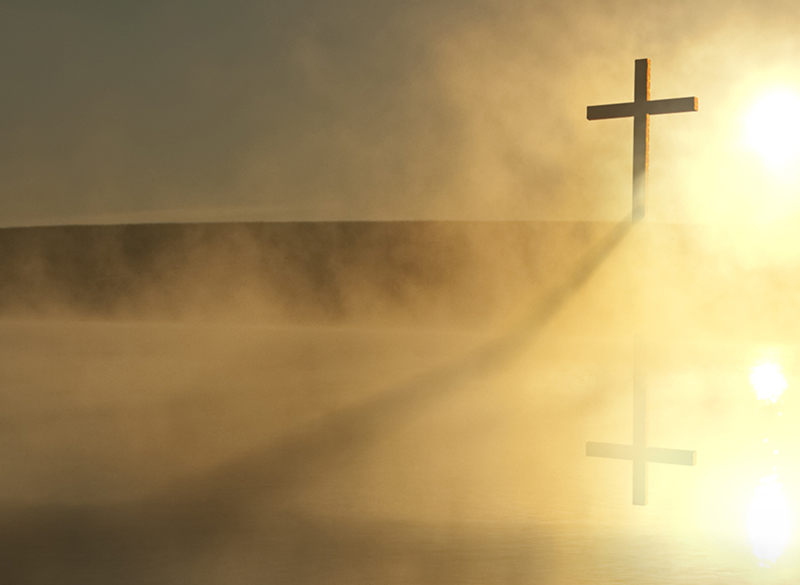Episode 1. In Slavery

Listen to the radio broadcast
Download audio file
There’s not one among us who wouldn’t say that slavery is one of the most tragic, abhorrent things imaginable. Strangely though this whole Easter thing has a lot to do with slavery. In fact, …
There’s not one among us who wouldn’t say that slavery is one of the most tragic, abhorrent things imaginable. Strangely though this whole Easter thing has a lot to do with slavery. In fact, it has everything to do with our slavery.
With Easter just around the corner, I thought this week that we would turn our thoughts back to where it all began. No … not that very first Easter in Jerusalem. Believe it or not, it all began, actually a few thousand years even before that.
Right now, today, this very minute, how many people do you think are in slavery? The estimates vary between 20 million and 100 million. Some put the number even higher. Many of those are children. Many of them are trafficked as sex slaves. That’s staggering! It’s shocking! In fact to think that there is even one slave in this world is absolutely abhorrent, don’t you think?
Official statistics can’t begin to tell the story of the misery of slavery. And where do you draw the line between a slave and someone whose labour is being exploited? Does it really matter? The point is that we people do terrible things to one another.
We’re heading into Easter this week and as we rush around to buy those last few chocolate Easter eggs, slavery may be, well, might feel like a really weird subject to be talking about. But slavery, well slavery is actually what Easter’s all about. Slavery is the place where Easter finds it’s real roots.
I can’t imagine two things further apart. Chocolate Easter bunnies on the one hand and slavery on the other. But we live in a funny world. So over these next couple of weeks, as you and I consume maybe a little bit more chocolate than we should, we’re going to discover the roots of Easter. And as we take that journey, my real question is this: does Easter really matter? Does it have anything relevant to say to you and me, here and now?
Well most of us know that Easter’s about more than chocolate. After all it’s the time in the TV news where they always flash up the stories of the grand Easter celebrations in the big cathedrals. Those Christians are busy celebrating the fact that Jesus Christ, allegedly the Son of God, died and rose again at Easter.
The basic thing that Christians believe is that every one of us, you, me, the next guy, we’ve sinned. We’ve done things that are wrong. And God is a God who loves us but also who punishes those who do wrong. Which turns out to be everybody. And so Jesus dies to pay for the sins of everybody. So that you and I can be forgiven if we believe in Him. While, at the same time, ensuring that justice is done. Someone was punished. He was punished. And then He rises again to give us victory over death and a life eternal. That is it in a nutshell. That is the executive summary. The question is: so what? What does that mean to the average punter in the supermarket aisle buying Easter eggs?
Well, the whole Easter thing goes back much further than 2,000 years ago and it turns out that there is an incredibly rich history and rich symbolism. And the more I’ve dug into that, the more I realise that this rich story has so much to say to you and to me. That’s what I’d like to share with you over these next couple of weeks on the program. Just snippets, bits and pieces of this rich history. You see, history repeats itself in familiar cycles. My hunch is that we’re in one of those cycles right now, Easter week.
Jesus rides into Jerusalem on a donkey. There’s crowds everywhere. Then there’s a plot to kill Him, it thickens. But the reason that the crowds are here, towards the beginning of the 1st century, is that they were in Jerusalem celebrating the first of three major annual festivals on the Jewish calendar.
It was the Passover festival. Sometimes it’s called the Festival of the Unleavened Bread. And as we unpick the whole Easter story, as we’re going to do on the program these coming weeks, what we discover is that Easter and the Passover are inseparable. In fact, if we don’t understand the Passover, Easter doesn’t begin to make sense.
The Passover goes back into Israel’s history to a time when they’ve been in slavery in Egypt for about 430 years. The year is around 1270 BC. The whole nation of Israel are slaves. Can you imagine that? The record, in Exodus chapter 12, verse 37, tells us that there were about 600,000 men plus women and children. So somewhere between 1 and 2 million Israelites, maybe more, in slavery. That’s a lot of slaves. And they’d been under terrible oppression. And this is what God says to Moses. The Lord said:
‘I have observed the misery of my people who are in Egypt. I’ve heard their cry on account of their hard task masters. Indeed, I know their sufferings and I have come down to deliver them from the Egyptians and to bring them up out of that land, to a good and broad land, a land flowing with milk and honey.’ It comes from Exodus, chapter 3.
And so God appoints Moses to go to Pharaoh and demand that Pharaoh let God’s chosen people go. Pharaoh refuses and so God curses Egypt through 10 plagues. He turns the Nile into blood. He sends plagues and sickness and all sorts of things. But Pharaoh still refuses. So God plays His trump card. The 10th plague that God brings on Egypt is terrible. Have a listen. It comes from Exodus chapter 11:
Moses said to Pharaoh, ‘Thus says the Lord. About midnight I will go through Egypt. Every first born in the land of Egypt will die. From the first born of the Pharaoh who sits on the throne to the first born of the female slave who is behind the hand mill and all the first born of livestock. Then there will be a loud cry through the whole land of Egypt, such as has never been before and never will be again. Not a dog shall growl at any of the Israelites though. Not at people, not at animals. So that you may know that the Lord makes a distinction between Egypt and Israel. Then all the officials of yours shall come to me and bow low to me and say, ‘Leave us, you and all the people who follow you.’ After that I will leave.’ And in hot anger he left Pharaoh.
See, that’s exactly what happened. This whole Passover thing was about the freedom of God’s people from slavery. And that’s exactly what Easter is all about. The whole slavery thing crept up on Israel. They started off in quite a privileged position in Egypt with Joseph effectively running the country. But then, as their numbers grew, little by little, the Egyptians enslaved them.
I wonder whether it isn’t the same with us. Most people today, most people listening to this program wouldn’t consider themselves as slaves. But stand back and take a look at life. Take a look at the treadmill that we’re on. The number of people labouring under high debt. The number of people labouring under the consequences of their lifestyles. The number of people, who should be happy, who should be fulfilled, who should be living a life of freedom but seemed to be trapped by life.
Look around at the marriages falling apart. The mortgages failing. So many things falling over. We think we’re free. But actually so many people are slaves. It creeps up on you. Almost without realising. Until one day you look at life and think, ‘This stinks, it really does. What went wrong? Why is my life like this?’
And then, as we’re munching on another chocolate Easter bunny, some guy comes along to talk about Easter and you hear God speaking His words into your heart:
‘I’ve seen your misery. I’ve heard your cry on account of your task masters. I know you’re suffering and I have come down to deliver you from this land. To bring you out into a good and broad land. A land flowing with milk and honey.’
What if God spoke words like those into your heart today? What if He is looking at your life right now and He feels the ache, He knows the burden, He hears the cry? And what if Easter has everything, everything to do with that? That would give Easter some real meaning wouldn’t it? I mean, this whole Easter thing, it could make a massive difference in our lives.











Comments